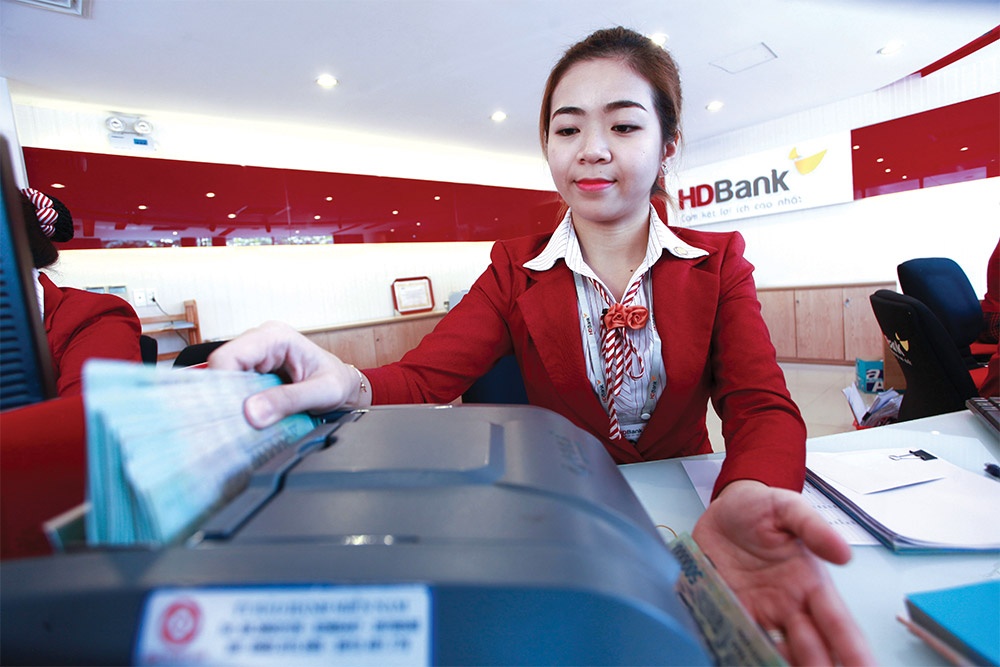INTERNATIONAL INVESTMENT
AND PORTAL
 Financial institution advances will aid efficiency and competitiveness, Photo Le Toan
Financial institution advances will aid efficiency and competitiveness, Photo Le Toan
At a government meeting on September 6, Prime Minister Pham Minh Chinh emphasised that September 15 is the deadline for completing decrees related to establishment of an international financial centre (IFC) in Vietnam. The country plans hubs in both Ho Chi Minh City and Danang.
Once operational, Vietnam’s IFC ecosystem will subject domestic banks to multilayered competition with international financial institutions while simultaneously compelling them to grow stronger to survive.
Truong Thi Thu Ba, who is deputy director of the Financial Institutions Department at BIDV, cautioned that domestic banks face the risk of internationalising pressure without sufficiently internationalising competitiveness.
“At present, BIDV is Vietnam’s largest bank by total assets, yet still small compared to century-old global financial institutions. Should we enter the IFC, we will have to compete in the same arena, under the same legal framework, as these giants,” she said. “Without careful preparation, Vietnamese banks will struggle to compete in the IFC and may even risk losing ground at home.”
She further noted that beyond limited scale, Vietnamese banks still face significant gaps in data infrastructure, technology, and digital integration.
“While local banks have been accelerating data collection and digital transformation, their technological capabilities remain in the early stages compared to global peers, particularly in cross-border payments and settlement infrastructure,” she added.
Despite these challenges, Nguyen Duc Lenh, deputy director of the State Bank of Vietnam’s Region 2, underscored that competition could also serve as a powerful driver of growth.
“The development of financial institutions, including commercial banks, finance companies, and leasing firms within the IFC, will ensure efficiency, competitiveness, and sustainable growth. This, in turn, will elevate domestic banking capacity, enhance safety and efficiency, and align Vietnamese banking services more closely with global financial institutions,” he said.
On September 10, Deputy Minister of Finance Nguyen Thi Bich Ngoc said, “For the IFC to grow meaningfully, alongside a robust legal framework, it is essential to offer specific and attractive financial products and services such as commodity exchanges, derivatives, and fintech solutions. These are key to building trust, attracting investors, and positioning Vietnam within the global network of financial centres.”
Do Thien Anh Tuan, a lecturer in public policy at the Fulbright School of Public Policy and Management, Fulbright University, noted that successful financial liberalisation must proceed step by step, selectively, and in line with domestic institutional readiness, supervisory capacity, and market strength.
“In parallel with market opening, Vietnam must strengthen the domestic banking system by addressing non-performing loans transparently and systematically. Moreover, full Basel II implementation should be completed, while selected Basel III tools should be adopted for systemically important banks, including leverage ratios, countercyclical capital buffers, and short- and long-term liquidity requirements,” he said.
“Equally important is strict application of international standards such as IFRS 9 in loan classification and credit risk provisioning to ensure accurate reflection of asset quality.”
Amid concerns about competitiveness, on September 9, HDBank, OCB, MSB, and VPBank joined the Alliance for Green Commercial Banks, an International Finance Corporation initiative under the World Bank Group.
Alongside 16 other members representing over $5.6 trillion in assets, they form the alliance’s inaugural cohort, marking a major step in accelerating the transition to green banking, embedding global best practices, and advancing sustainable finance in emerging Asia-Pacific markets.
“This cohort reflects the growing commitment and leadership of commercial banks in green finance,” said Allen Forlemu, the corporation’s regional industry director for the Financial Institutions Group, Asia-Pacific. “The alliance is a community of committed institutions working to transform finance, close the multi-trillion-dollar climate finance gap, and position emerging markets at the forefront of sustainable economic growth.”
Anil Singh Gill, president of the Fintech Association of Malaysia, suggested to VIR that competition between domestic and foreign banks within the Ho Chi Minh City arm of the IFC could also create fertile ground for strategic partnerships.
“Foreign banks would be able to collaborate more extensively with local banks and fintech startups, combining international expertise with local insights to deliver stronger and more relevant financial solutions,” Gill said. “By concentrating resources and talent in high-growth areas such as embedded finance, payments, wealthtech, and more, foreign banks can move beyond transactional services and become integral partners in the country’s overall financial transformation.”



















